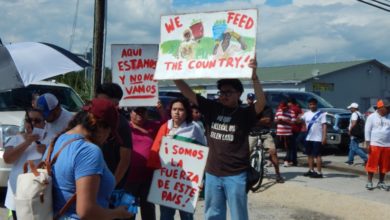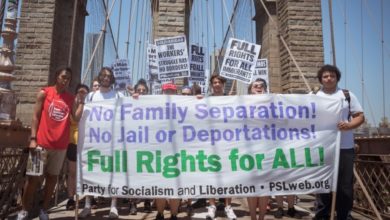The following article is adapted from a presentation delivered at a Nov. 12, 2005 Conference on Socialism in Los Angeles, hosted by the Party for Socialism and Liberation. Juan José Gutiérrez is director of the Latino Movement USA and a member of the Los Angeles Steering Committee of the ANSWER Coalition—Act Now to Stop War and End Racism.
 Hundreds turn out to confront the anti-immigrant Minutemen in Sacramento, Calif. on Oct. 29, 2005. Photo: Bill Hackwell |
Why do we have an immigration problem in the United States? The reason is simple. We have a problem because of the existence of a capitalist system where the primary rights are devised to protect the interests of those in business, and for whom the main goal is the maximization of profit.
This is a country of immigrants. This country’s economy was built into what it has become, in large part, by wave after wave of immigrant workers from throughout the world. For that reason alone one would expect immigrants to be treated with respect and consideration. Yet the exact opposite has happened in recent decades. All immigrants, especially the undocumented, are forced by political or economic circumstances to come to the United States to be super-exploited by the business interests here.
Let me briefly illustrate this important point by citing a couple of very important historical developments that help us better understand what is going on in the immigration policy arena. U.S. policies have resulted in mass undocumented migration to the United States.
In 1979, the Sandinista Revolution triumphed in Nicaragua. That historic event led to the intensification of revolutionary struggle in other nearby countries like El Salvador and Guatemala. The revolutionary wars in the Central American region and the violent repression that was unleashed against the working class by the fascist-like governments of those countries, with very strong military and political backing by the U.S. government, forced hundreds of thousands of Central Americans to flee their communities and to migrate to the United States, where they joined the ranks of the super-exploited.
Throughout this time, the U.S. government simultaneously set in motion what we now commonly have come to know as capitalist globalization. With regards to Latin America, the U.S. government undertook the task of forcing upon the people of the Americas what it termed the Free Trade Area of the Americas.
In 1993, after negotiating for several years, the governments of Canada, Mexico and the United States signed the North American Free Trade Agreement. NAFTA went into effect in 1994.
The results have devastated worker communities in all three countries. In the interest of time, let me illustrate by briefly mentioning what NAFTA has meant for workers in Mexico and the United States.
First, NAFTA prohibits the Mexican government from subsidizing agricultural production. But at the same time, it allows the government of the United States to continue providing subsidies to U.S. agriculture to the tune of billions of dollars every year. The practical result is that U.S. producers are dumping in the Mexican market their subsidized products at prices with which Mexican producers can’t compete. With no jobs, and in order to survive, many Mexican farmers are left with only one choice: to migrate to the United States.
On the U.S. side, NAFTA has meant that many good-paying jobs have gone to Mexico. For example, U.S.-owned auto plants have set up shop in various parts of Mexico where workers earn a fraction of what those companies were required to pay under the terms of their collective bargaining agreements to their U.S. workers.
Unlike their displaced Mexican counterparts who migrate to the United States, American workers choose not to migrate for obvious reasons. U.S. workers do not have the incentive to migrate to Mexico to earn one-tenth of their former salaries. Plus, U.S. workers do not speak Spanish and do not know enough about Mexican culture or the country.
What happens next? We see it, we read it and we hear it. The agents of capitalism distort the terrible situation created by the so-called free trade. They do so by working long and hard to exploit the anger of the U.S. worker to foment racist feelings and attitudes against the undocumented and against everything foreign, especially against non-European immigrants. This is done in order to divide, weaken and maintain effective political control of the working class, and to ensure their continued economic exploitation.
That is why today the U.S. government—instead of legislating comprehensive immigration reform—promotes the Bush “guest worker” immigration plan, which in effect amounts to indentured servitude for immigrants. This after Bush had promised his “good friend,” Mexican president Vicente Fox, an amnesty plan for Mexican immigrants.
In order to leverage the Bush immigration plan, the political right wing in the United States funds and promotes groups like the so-called Minutemen. This fascist group and others like it are spreading like wildfire throughout the country, increasing racist attitudes against immigrants and sowing confusion amongst the working class about who their real class enemies are.
Anti-immigrant legislation proposed
This sentence from the Nov. 9 Dallas Morning News gives a sense of the hysteria that is being whipped up. “Radio talk-show host J.C. McClain could hardly contain his excitement as he recalled the time he had to pull his pistol in front of an illegal [sic] immigrant whose pants were still wet from splashing across the Rio Grande.” McClain told the reporter that the experience had “made his day.”
The actions by the Minutemen in communities across the country has prompted the introduction of a bill on Capitol Hill to deputize citizen patrols and give them millions of dollars in federal funds. So far it has 46 co-authors.
Other ultra conservative members of Congress, like San Diego’s Duncan Hunter—the chairman of the House Armed Services Committee—are introducing legislation to build a 2,000-mile fence across the U.S.-Mexico border. Pat Buchanan first proposed this fascistic idea in 1996 when he ran for president.
 Crosses in Tijuana mark the deaths of immigrants who died crossing the U.S.-Mexico border. Photo: Janet Schwartz/KRT |
The federal government has already started to build such a fence. So far it covers about 80 miles of the border. So there are 1,920 miles or so to go. The proponents of this idea insist that the time has come to build a serious border fence, one modeled after what the Israelis are building in the West Bank.
As the construction of this wall continues, and with nearly 500 workers dying every year along the U.S.-Mexico border, I don’t have to tell you what it would do to undocumented workers coming to work in the United States.
Another anti-immigrant, anti-worker bill was introduced this month by John Hostettler, a Republican congressperson from Indiana. Under his bill, called the “Secure America Act,” the president would be allowed to send the military to the Mexican border to patrol and stop undocumented immigrants.
Representative Nathan Deal from Georgia introduced another immigration bill to deny citizenship to children born in the United States to undocumented immigrants. So far, this bill has 80 co-sponsors. Needless to say, when passed, this bill would effectively destroy the 14th Constitutional amendment, which states, “All persons born or naturalized in the United States, and subject to the jurisdiction thereof, are citizens of the United States.” The very conception of such a bill dishonors the struggle, the sacrifice and the blood of those who fought and died to eradicate slavery and racism during the U.S. Civil War.
Some would want to think that this type of fascist political thinking is the sole domain of the Republican right wing. But Arnold Schwarzenegger isn’t the only politician to have called the Minutemen “honorable citizens.” Democratic New Mexico Governor Bill Richardson called them “patriotic Americans who like him are sick and tired by the inaction of the Federal Government to deal with illegal migration.” Both he and Arizona governor Janet Napolitano declared a state of emergency against undocumented workers in their respective states. Fabian Nuñez, the Democratic speaker of the California Assembly, called on Gov. Schwarzenegger to emulate his New Mexico and Arizona colleagues.
Immigrants and Hurricane Katrina
The problems of the undocumented are not just along the U.S.-Mexico border. As reconstruction got under way after the devastation caused by Hurricane Katrina, Bush suspended a federal wage law, the Davis-Bacon Act. That allowed contractors with federal contracts involved in the rebuilding in Louisiana and Mississippi to pay workers less than the prevailing wage.
As thousands of immigrant workers decided to go work in the reconstruction effort, they were paid less than the prevailing wage. There are media reports that many immigrant workers were never paid at all. Their employers simply took the money from the government and disappeared.
After Bush and the Republicans were forced to reinstate the federal wage law, New Orleans mayor C. Ray Nagin declared to business people from the area, “How do I make sure New Orleans is not overrun with Mexican workers?” And if the mayor’s comments weren’t offensive enough, Democratic senator Mary Landrieu said, “While my state experiences unemployment rates not seen since the Great Depression, it is unconscionable that illegal workers would be brought into Louisiana, aggravating our employment crisis and depressing earnings for our workers.”
These racist statements contrast with the comments of Alonzo Moran, an undocumented worker from the Mexican State of Tamaulipas who was forced by NAFTA to abandon his farm and migrate to Kennett, Mo., where he found work driving a fork lift in a cotton gin for a company in that U.S. town. He said, “What is my dream for the future? I want corn prices to be high again so I can go back to Mexico to farm. But I don’t know if that will happen.”
Internationalize the workers’ struggle
In the interest of time, I won’t tell you what other ingenuous immigration reform packages are being proposed in Congress. Instead, I will tell you what I think we need to do to properly address this issue.
First, let us agree that capitalism and U.S. imperialism victimize all workers, documented and undocumented. As we have seen, imperialism’s so-called free trade agreements—which are not really for free trade at all—or globalization of the market, are in effect hurting all workers.
Capital, goods and services have no borders. Therefore, let workers have no borders either. Let us internationalize the workers’ struggle.
The struggle to win full rights for undocumented workers will remain a hard one. But we must insist on an unconditional amnesty for undocumented workers as the only acceptable solution for this issue, which ultimately is an issue for the U.S. working class. Accepting anything less than a general amnesty will not only not solve the problem of undocumented migration but will condemn that segment of the working class to the unacceptable condition of modern day slaves. That is unacceptable.
Can we win this incredibly difficult struggle? Absolutely.
Politically speaking, the people of the United States are once more waking up. The anti-war struggle, Katrina and the corruption and racism at all levels of government and in our society already have galvanized many and re-energized people who were active in previous political struggles.
The growing political struggles in Latin America must be viewed as clear and convincing evidence that the working class is entering a new stage in its struggle for complete emancipation.
And should we need additional evidence to convince ourselves that in the end we will triumph in our struggle for liberation of immigrant workers, let us look no further than France, where immigrants and the their French-born children are rising up against racism and unemployment.
I believe the situation for immigrants in France is terrible—no question about it. But it is not nearly as bad as it is for immigrants in the United States.
Let us intensify our organizing and mobilizing efforts in the immigrant community. Full rights for undocumented workers! No border can stop the just struggle of workers!
Articles may be reprinted with credit to Socialism and Liberation magazine.






